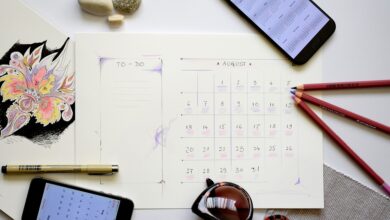
The Benefits of Using a Calendar for Stress Management
In today’s fast-paced world, the demands of daily life can quickly overwhelm even the best of us. Juggling work, family commitments, and personal interests can create a perfect storm of stress. However, one highly effective tool for managing stress is the calendar. Whether you prefer a digital solution or a traditional paper planner, using a calendar can offer significant benefits in organising your life and reducing anxiety. This article explores how using a calendar can help manage stress and enhance overall well-being.
Enhanced Organisation
At the core of stress management is effective organisation. A calendar provides a central location for all your appointments, tasks, and deadlines. This visibility can prevent feelings of chaos and disorganisation that often lead to stress. By having a clear view of your responsibilities, you can prioritise your tasks and allocate time efficiently, thus reducing the likelihood of missing deadlines or overlooking important commitments.
Creating structured time blocks in your calendar allows you to dedicate specific periods to different activities. This method can be particularly beneficial if you find yourself overcommitting. By scheduling in advance, you can assess your availability realistically, enabling you to say no to additional tasks that might otherwise lead to overwhelm.
Improved Time Management
Effective time management is a cornerstone of stress reduction. Using a calendar helps you allocate your time wisely, allowing you to break tasks into manageable chunks. The concept of time blocking is especially useful here, where you reserve specific blocks for various activities, such as work tasks, exercise, and relaxation. By adhering to a structured timetable, you can minimise unproductive time and free up hours for leisure and self-care.
Moreover, scheduling regular breaks and downtime in your calendar can prevent burnout. It’s easy to become absorbed in work or social commitments, leading to fatigue. By intentionally scheduling breaks, you can recharge your mind and body, facilitating greater focus and productivity when you return to your tasks.
Prioritisation of Tasks
One of the key advantages of using a calendar is the ability to prioritise tasks effectively. By visually mapping out your responsibilities, you can identify what is urgent and important versus what can be deferred. This skill is particularly valuable when facing multiple deadlines or responsibilities, as it prevents the common pitfall of feeling overwhelmed by trying to tackle everything simultaneously.
By assigning due dates and timeframes to tasks, you create a sense of urgency that can motivate you to complete them. Additionally, you can categorise tasks based on their importance or effort required, making it easier to tackle high-priority items first. This not only enhances productivity but also provides a sense of accomplishment as you check items off your list, further alleviating stress levels.
Reduced Anxiety Through Visibility
When your commitments are scattered across different platforms—be it emails, sticky notes, or mental reminders—anxiety can easily build up as you attempt to keep track of everything. A calendar centralises your obligations, providing a visual representation of what lies ahead. This visibility can significantly reduce anxiety as you know exactly what to expect each day.
Furthermore, many people find comfort in having a clear plan. Knowing what you need to accomplish allows you to mentally prepare, mitigating feelings of uncertainty. When unexpected situations arise, having a calendar can facilitate quick adjustments, helping you maintain control over your schedule and reducing stress.
Encouragement of Healthy Routines
Integrating healthy habits into your daily routine is essential for managing stress. A calendar is a useful tool for establishing and reinforcing these habits. By scheduling dedicated time for exercise, meal prep, and mindfulness practices, you create a structured routine that promotes physical and mental health.
Regular physical activity, for instance, is well-documented to reduce stress. By blocking out time for workouts in your calendar, you are more likely to prioritise your health, which can lead to better overall well-being. Similarly, setting aside time for relaxation activities, such as meditation or reading, encourages a balanced lifestyle, reducing the chances of burnout.
Accountability
Having a calendar can foster a sense of accountability, both to yourself and others. If you share your calendar with family members or colleagues, they can help keep you on track with your commitments. This shared visibility not only encourages responsibility but also opens the door to collaboration. When everyone is aware of each other’s schedules, it becomes easier to coordinate activities, reducing the stress of logistical challenges.
By setting specific goals and deadlines in your calendar, you can track your progress over time. This accountability can motivate you to stay on target and achieve the objectives you’ve set for yourself. Whether it’s completing a work project or adhering to a fitness regimen, the presence of deadlines creates a sense of urgency that can push you to follow through.
Enhanced Productivity
In a society that often equates busyness with productivity, it’s crucial to recognise that efficiency does not necessarily stem from working longer hours. Instead, effective prioritisation and time management can lead to greater output in less time. Calendars facilitate this by allowing you to identify periods of peak productivity and allocate your most demanding tasks accordingly.
For instance, if you know that you are most alert in the mornings, you can schedule high-concentration tasks during that time. Similarly, you can reserve afternoons for less demanding responsibilities. This method not only optimises your productivity but also ensures you are utilising your energy levels wisely, thus preventing unnecessary strain and stress.
Strategic Planning
A calendar is not merely a tool for day-to-day activities; it can also play a crucial role in long-term planning. Having a clear overview of your upcoming months allows you to set and work towards specific goals—be it professional advancements, personal projects, or financial objectives. By mapping out milestones on your calendar, you can break down long-term goals into manageable tasks that don’t feel overwhelming.
This long-range visibility can also alleviate stress related to future obligations. Knowing that you have a plan and that your goals are laid out over an extended timeline can foster a sense of security, reducing any anxiety about upcoming responsibilities. Being proactive rather than reactive in your planning can mitigate last-minute stress and improve your overall quality of life.
Reflection and Review
Regularly reviewing your calendar can provide valuable insights into how you spend your time. Taking time to reflect on what tasks were completed, which ones caused stress, and how well you adhered to your schedule can lead to greater self-awareness. This practice enables you to adjust your commitments and renegotiate deadlines based on personal capacity and changing circumstances.
Daily or weekly reviews of your calendar can also highlight patterns in your behaviour, allowing you to identify stress triggers. Once acknowledged, you can work towards addressing these stressors head-on, developing healthier management strategies and ensuring that your calendar serves you rather than the other way around.
Improved Work-Life Balance
Achieving a harmonious work-life balance is essential for maintaining mental well-being. A calendar can be instrumental in establishing boundaries between professional responsibilities and personal time. By clearly delineating work hours and personal commitments, you can create a balanced lifestyle that prioritises both work and relaxation.
Scheduling time for family, friends, or even self-care activities ensures that you dedicate time to recharge and connect with loved ones. This balance is crucial for preventing burnout and maintaining a positive outlook on life. A well-maintained calendar provides the structure to achieve this equilibrium, enabling you to enjoy both personal and professional fulfilment.
Conclusion
The benefits of using a calendar for stress management are numerous and impactful. From facilitating organisation and prioritising tasks to fostering accountability and improving work-life balance, a calendar serves as a powerful tool for managing daily pressures. By leveraging its capabilities, you can create a structured and efficient approach to your responsibilities, ultimately leading to reduced anxiety and enhanced well-being.
Incorporating a calendar into your daily routine can contribute significantly to a healthier and more balanced lifestyle. Its versatility allows for adapting to individual needs and preferences, making it a tailored solution for effective stress management. In a world rife with distractions and demands, mastering the art of calendar management can be your key to a calmer, more organised life.




